Latin America 2023 – the enduring flame of hope
Campaign News | Thursday, 2 February 2023
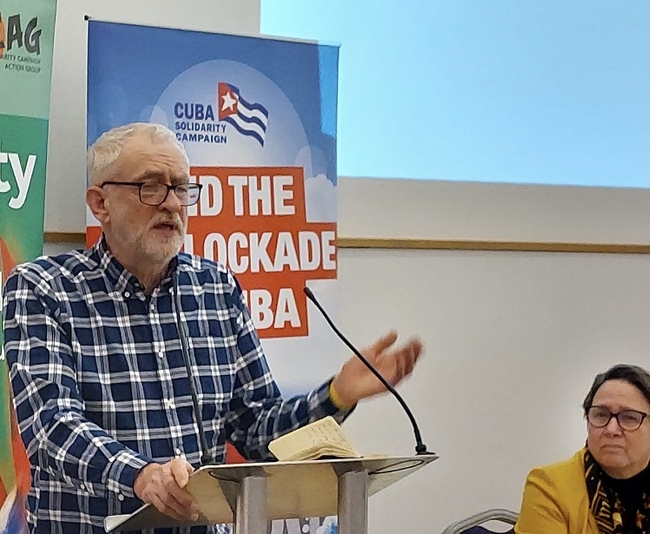
Jeremy Corbyn MP and Cuban Ambassador Bárbara Montalvo Álvarez
Over 250 people gathered in Central London, on Saturday 28 January, for the seventeenth annual Latin America conference. At the home of the National Education Union (NEU), the conference provided an opportunity for delegates and activists to take inspiration from how people from right across the region have fought back – from progressive mass movements to the struggles for independence and sovereignty and resistance to neo-liberalism and US domination.
The last Latin America conference took place in December 2021 and, since then, the region has undergone further change. The return to power of Luiz Inácio Lula da Silva in Brazil in December provides enormous hope, especially following the election of other left and progressive governments.
Opening plenary
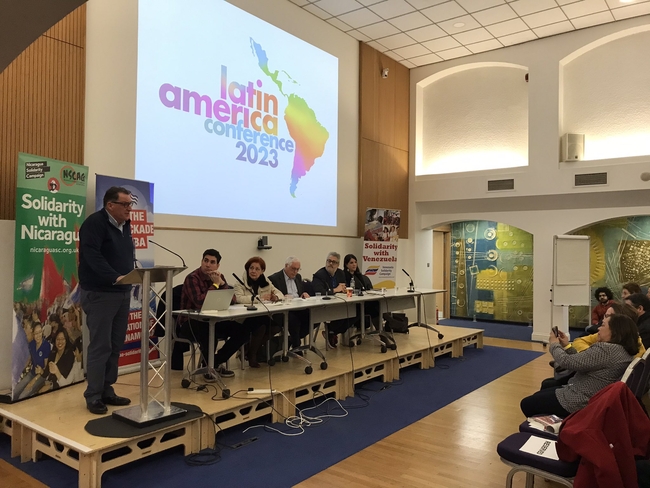
Bernard then introduced the opening panel, with US-based author and lawyer Dan Kovalik invoking the memory of Roberto Clemente, a baseball player for his hometown Pittsburgh Pirates who lost his life delivering aid to the people of Nicaragua, a memory which he said embodies the internationalism at the core of the Latin America conference. After detailing the brutal impact of US sanctions on Venezuela and Nicaragua, Dan closed with a message to all those present: “Latin America has consistently been the biggest hope in my life. Let’s keep supporting our comrades.”
Her Excellency Rocio Maneiro, the Venezuelan Ambassador to the UK, saluted what she called “the biggest and most powerful solidarity movement with Latin America in Europe”, before emphasising her nation’s complete rejection of foreign intervention, demanding that their democratic processes and rights as a sovereign nation are respected.
Surveying processes in countries such as Brazil, Bolivia and Colombia, the TUC’s Senior International Officer Mariela Kohon outlined how a combination of mobilisations from social movements, to labour organising to electoral campaigning have delivered inspirational results in “the region where the left is consistently winning.” Mariela highlighted the irony of seeing trade unionists in Colombia and Peru sending messages of solidarity with the British trade union movement in the face of anti-strike laws and applauded their commitment to internationalism.
Assistant General Secretary of UNISON, Kevan Nelson, recounted Cuba’s long history of the resistance to the United States, reflecting that “on the 170th anniversary [José] Martí’s birth, let’s remember that Cuba’s anti-imperialism didn’t start in 1959.” Detailing the many accomplishments that have been achieved since the Cuban Revolution in 1959, Kevan described Cuba as an “example to the world”, proclaiming that “UNISON remains steadfast in its support for Cuba and the Cuba Solidarity Campaign.”
Closing off the opening plenary, Labour MP for Leeds East Richard Burgon celebrated the “advance of progressive forces” in the region, highlighting the significance of Colombia’s election of Gustavo Petro in a country which has historically been a reserve of reaction and acted as the US’s policeman in the region. Richard expressed hope that while “Latin America was the birthplace of the neoliberal model which has failed the world…it has fought to be its graveyard too.”
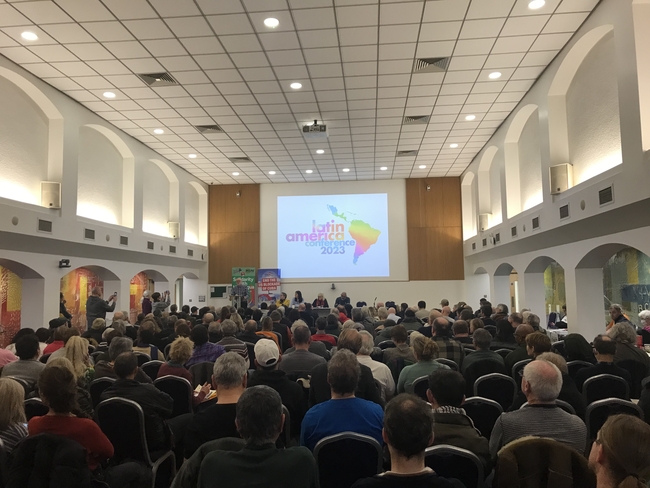
Throughout the day more than 60 speakers took part in 23 seminars and film screenings, and delegates browsed stalls from solidarity campaigns, progressive organisations and publishers. Three packed seminars focused on Cuba.
José Martí to Fidel: Roots and principles of the Cuban Revolution
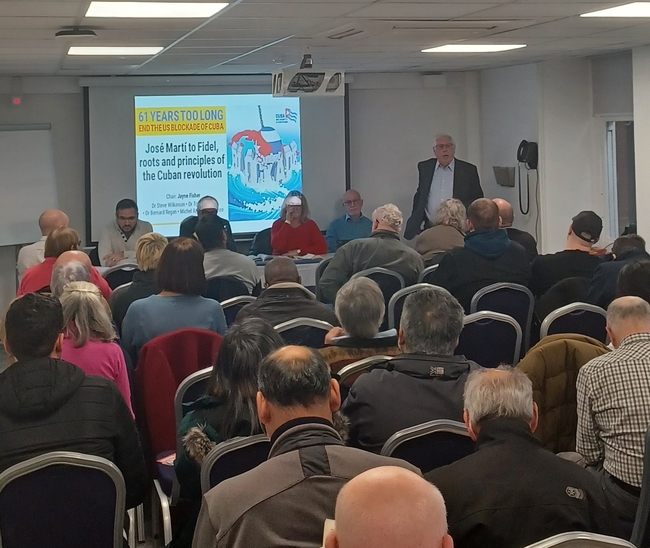
A stellar panel, chaired by CSC Executive Committee member Jayne Fisher, gathered to discuss Martí’s legacy, the deep connection between his and Fidel’s political thought and how these ideas laid the groundwork for the Cuban Revolution. Dr Stephen Wilkinson, of the International Institute for the Study of Cuba, highlighted Martí’s commitment to anti-imperialism and his profoundly anti-racist principles. Stephen described Martí as “the spiritual and intellectual father of the nation… a nation that would be for the good of all.”
Dr Tony Kapcia of the University of Nottingham went on to trace the lineage of Fidel’s conception of revolution, using his famous speech in 2000 on the issue as an example, back to Martí. Indeed, Tony noted that the speech could have been written by Martí himself.
Dr Bernard Regan, CSC’s chair, followed and focused on Cuba’s proud record of internationalism since the revolution in 1959. Echoing the thoughts of the previous speakers, Bernard traced this history back to Martí’s practice and beliefs. Bringing this shared commitment into focus, Bernard quoted Nelson Mandela on his visit to Cuba following his release from prison:
“Your presence and the reinforcement of your forces in the battle of Cuito Cuanavale was of truly historic significance…The defeat of the racist army at Cuito Cuanavale has made it possible for me to be here today!”
Wrapping up the session, Michel Rodriguez Alonso, First Secretary of Cultural, Academic and Scientific Affairs at the Cuban Embassy, expanded on the similarities between Martí and Fidel. Once again referring to Fidel’s speech on revolution in 2000, Michel emphasised the shared belief in the importance of unity, independence, social justice and the need to evolve the concept of revolution.
Cuba: Innovation and progress in the face of adversity
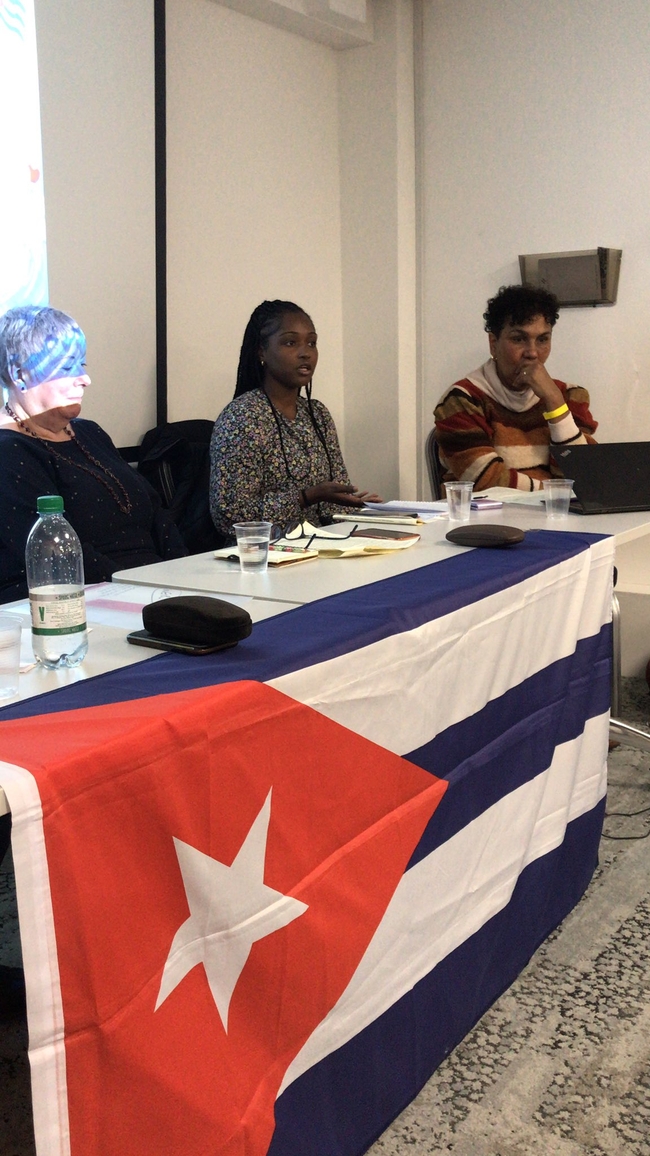
Adrian Weir, former Assistant Chief of Staff at Unite, discussed the development of workplace democracy and the key role that trade unions play in Cuban society. You can read about trade unions in Cuba in a recent article Adrian co-authored in the journal ‘International Union Rights’.
Dr Valia Rodriguez, a Cuban doctor and scientist who lives in the UK, detailed the remarkable story of Cuba’s biotechnology and pharmaceuticals industry, including the development of Cuba’s own COVID-19 vaccines.
Following a recent trip to Cuba as part of an NEU delegation, activist Griffiths Nguete spoke about her experiences on the island and what she saw in Cuba’s education system. From the attention that is paid to children with special educational needs to the focus on early intervention, Griffiths told the attendees that she was inspired by Cuba’s approach to education:
“They place so much importance on ensuring children leave school educated…they recognise that everyone should feel like they’re part of society.”
Finishing the session, Michel Rodriguez Alonso returned to explore the concept of resistencia creativa, or creative resistance, which Cuban President Miguel Díaz-Canel expounded in a speech in December. What does resistencia creativa mean? As Michel explained, it is simply “utilising the talent and capacity of the Cuban people” to not just resist, but to innovate and address the problems of development that are caused by the US blockade. The production of Cuba’s own COVID-19 vaccines, and the island’s response to the pandemic in general being a prime example of resistencia creativa.
Cuba and the United States: Impasse or progress?
The final Cuba seminar, chaired by CSC Director Rob Miller, focused on the current state of Cuba-US relations and opened with Her Excellency Barbara Montalvo thanking the British trade union movement and the CSC for the support and solidarity that has been extended to her nation over the years. On the blockade and relations with Cuba’s neighbours to the north, she added that while “so many things are changing in the world, the blockade isn’t.”
Dr Emily Morris of the Institute of the Americas detailed the huge economic and political challenges that Cuba has faced over recent years, with the effects of the blockade and sanctions compounded by the pandemic. Emily noted that given the long, difficult and intertwined history of the two nations, it’s possible that relations “can never be normal”, but the priority for Cubans remains to “build their own model.”
Rallying those in the room to join the CSC as members, to get their union branches and regions to affiliate, Kevan Nelson of UNISON spoke about the movement’s efforts to free the Miami Five and the history of his own union’s solidarity with Cuba as examples of internationalism in practice and what it can achieve.
Final plenary
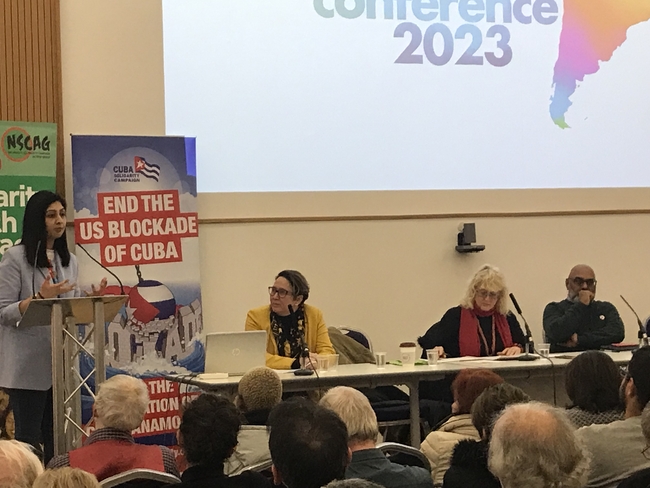
After a full day of 23 seminars, on topics ranging from climate justice and ecology in Nicaragua to making black lives matter a reality in Latin America and the Caribbean, the conference closed with the final plenary chaired by Assistant General Secretary of Unite Diana Holland. Opening the panel, Director of War on Want Asad Rehman gave an impassioned speech, calling for activists can take hope from how social movements in countries such as Colombia and Brazil have challenged the power of capital and its associated reactionary politics.
Delegates then saw a short film focusing on the huge political significance of Lula’s election victory in Brazil, which the next speaker witnessed first hand. Zarah Sultana, Labour MP for Coventry South, acted as an electoral observer in Brazil and described how Lula has “built an inspiring front for the soul of Brazilian democracy” and encouraged all those in attendance to continue with the important work of international solidarity, particularly in the face of threats to undermine the region’s progress.
Her Excellency Barbara Montalvo spoke of how “the world needs solidarity, cooperation and mutual respect, not blockades and sanctions” in order to face our common challenges. Barbara restated Cuba’s absolute commitment to “peace, unity and diversity” in the region in order to “achieve a more just and equitable world for all.”
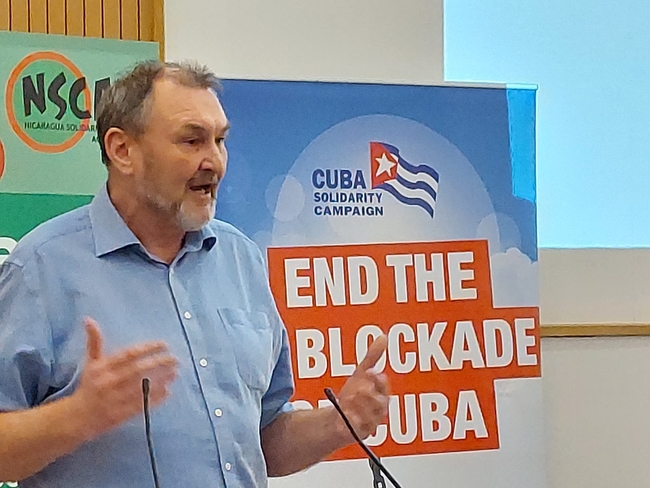
Just days away from a historic day of industrial action for his union, NEU Joint General Secretary, Kevin Courtney outlined how trade unions have been central to progressive advances in Latin America and in mounting crucial opposition to the reactionary threats they face. Focusing on Cuba, Kevin noted that despite being a poor country, Cuba spends a higher proportion of its GDP on education than any other country in the world. Highlighting the cruel effect that the blockade has on Cuba, he spoke of the importance of the NEU and CSC’s Viva la Educación campaign and the practical solidarity that members of his union have shown the island and its people over the years.
Closing the session , MP for Islington North Jeremy Corbyn told delegates of the need to oppose the use of lawfare to depose progressive leaders in the region, from Brazil to Peru, and paid tribute to the extraordinary social movement that saw the restoration of democracy in Bolivia following the coup in 2019. And while Bolsonaro supporters showed their true colours by attacking government buildings to try and overturn the election result, Lula showed his by thanking the cleaning staff who had to deal with their mess. Jeremy began drawing his speech to a close by highlighting the danger that Cuba poses as a nation. Not a danger to its people, to the people of Latin America, or the world, but a danger “because of its example… an example of how a country can choose to invest in its people.” Jeremy brought to conference to a close by calling all activists and trade unionists to show practical solidarity with all those in Latin America helping to build a better world.
CSC and Latin America 2023 organisers would like to thank all the speakers, volunteers, delegates and supporting organisations who attended, especially the National Education Union, without whom the event would not have been possible.

A packed hall listens in on the final plenary

NEU Joint General Secretary Kevin Courtney

Labour MP Zarah Sultana addresses the crowd









